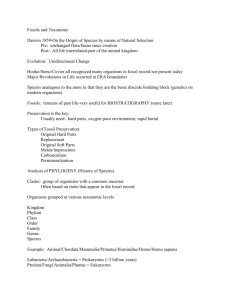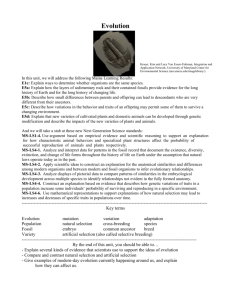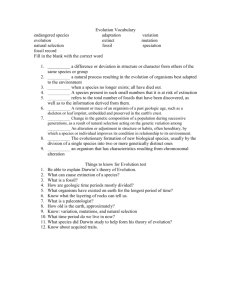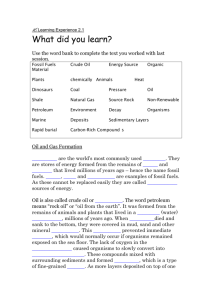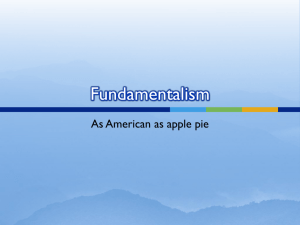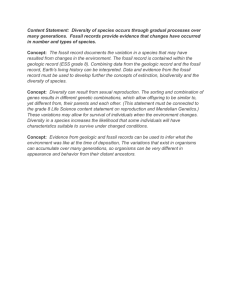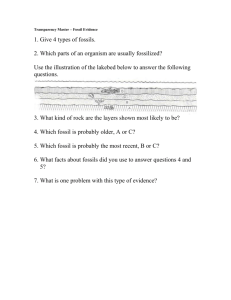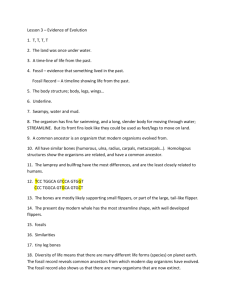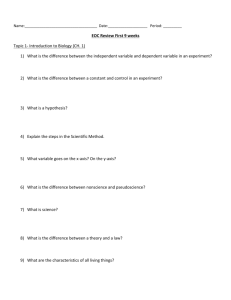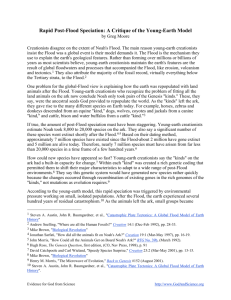8.1 Chapter 8 Questions With Answers
advertisement
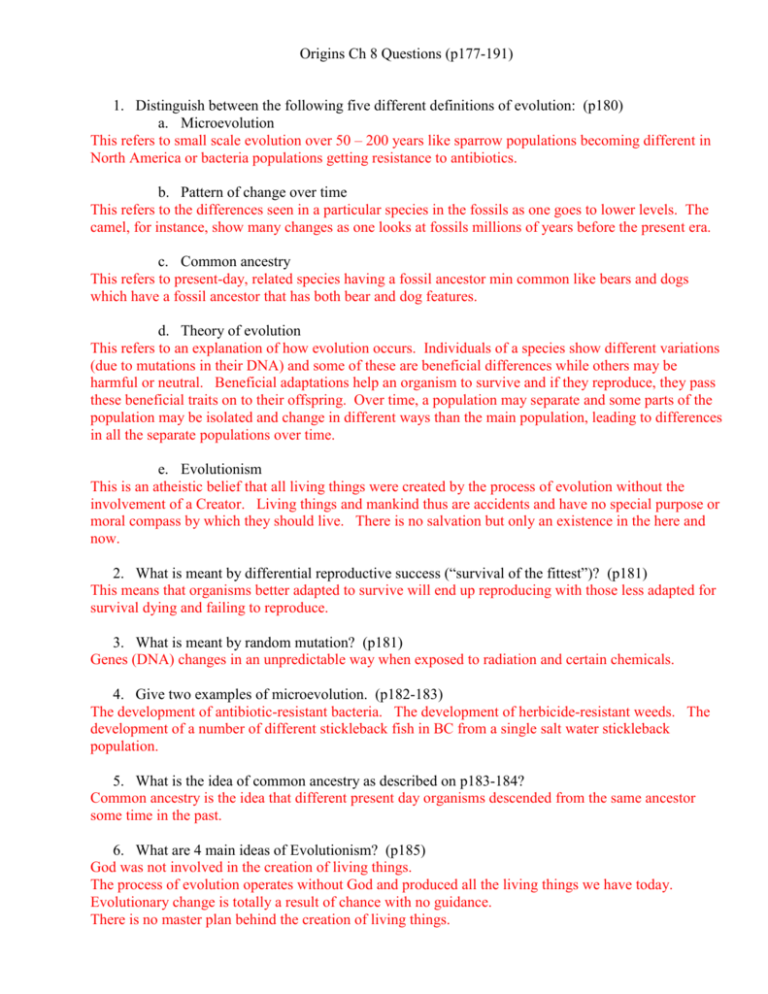
Origins Ch 8 Questions (p177-191) 1. Distinguish between the following five different definitions of evolution: (p180) a. Microevolution This refers to small scale evolution over 50 – 200 years like sparrow populations becoming different in North America or bacteria populations getting resistance to antibiotics. b. Pattern of change over time This refers to the differences seen in a particular species in the fossils as one goes to lower levels. The camel, for instance, show many changes as one looks at fossils millions of years before the present era. c. Common ancestry This refers to present-day, related species having a fossil ancestor min common like bears and dogs which have a fossil ancestor that has both bear and dog features. d. Theory of evolution This refers to an explanation of how evolution occurs. Individuals of a species show different variations (due to mutations in their DNA) and some of these are beneficial differences while others may be harmful or neutral. Beneficial adaptations help an organism to survive and if they reproduce, they pass these beneficial traits on to their offspring. Over time, a population may separate and some parts of the population may be isolated and change in different ways than the main population, leading to differences in all the separate populations over time. e. Evolutionism This is an atheistic belief that all living things were created by the process of evolution without the involvement of a Creator. Living things and mankind thus are accidents and have no special purpose or moral compass by which they should live. There is no salvation but only an existence in the here and now. 2. What is meant by differential reproductive success (“survival of the fittest”)? (p181) This means that organisms better adapted to survive will end up reproducing with those less adapted for survival dying and failing to reproduce. 3. What is meant by random mutation? (p181) Genes (DNA) changes in an unpredictable way when exposed to radiation and certain chemicals. 4. Give two examples of microevolution. (p182-183) The development of antibiotic-resistant bacteria. The development of herbicide-resistant weeds. The development of a number of different stickleback fish in BC from a single salt water stickleback population. 5. What is the idea of common ancestry as described on p183-184? Common ancestry is the idea that different present day organisms descended from the same ancestor some time in the past. 6. What are 4 main ideas of Evolutionism? (p185) God was not involved in the creation of living things. The process of evolution operates without God and produced all the living things we have today. Evolutionary change is totally a result of chance with no guidance. There is no master plan behind the creation of living things. Origins Ch 8 Questions (p177-191) There is no loving guidance of the process of evolution. 7. Do you think randomness or chance implies lack of meaning or purpose? Explain (p186) No, the words randomness or chance indicate our inability to predict but inability to predict does not imply meaninglessness. A roll of the fair dice is unpredictable but this is totally unrelated to meaning or purpose. 8. How does the Bible view “chance” or randomness? (p186) The Bible views chance as under God’s control. The Israelites used to throw lots (unpredictable) to get answers from God about what they should do at certain times. The lot is still used in some churches. 9. Describe how the following groups of Christians differ in terms of what they believe concerning the age of the earth, the fossil record and evolution: a. Young-earth creationists Young-earth creationists believe the earth is young (4,000-10,000 yrs). They believe the fossil record is a record of living things killed and buried by Noah’s flood. They believe that microevolution (small-scale changes) probably occurred but no macroevolution. b. Progressive creationists Progressive creationists believe the earth is old. They believe that the fossil record is a record of living things that have lived over the many ages of earth’s history over millions of years. They differ about evolution – some believe that only microevolution occurred but God specially-created the main different kinds of organisms. Others believe that God used evolution to create most living things but specially created certain organisms like man. c. Evolutionary creationists Evolutionary creationists believe the earth is old. They believe the fossil record shows how organisms changed over millions and billions of years. They believe that God used the process of evolution to create all living organisms, including man. 10. On page 188, two premises (premise 1 and premise 2) are described. Is premise 1 true? Explain. Premise 1 is false since it is possible that God used evolution to create many or all organisms. Since premise 1 is untrue, then premise 2 is false. 11. What is Deism? (p190 2nd to last paragraph) Deism is the idea that God started his creation with laws and then left it to run by itself using those laws. It is like a clockmaker who designs his clock, winds it up and lets it go on its own. 12. Some Christians argue that God created only by natural processes. Some Christians argue that God created only through miracles. Some Christians argue that God created both through processes and through miracles. After reading p189-190, what view do you think is probably is the most sound and why? It would seem that it is more sound to understand that God created(creates) both through processes and through miracles. We can see today that God is creating new life, new persons, new stars so He probably was doing this in the past as well as today. Origins Ch 8 Questions (p177-191) 13. Some Christians describe the discussion about evolution and creation as a choice between God and young-earth, special, miraculous creation or atheism and evolution. Comment on this, especially as a Christian student entering a Secular university. A Christian has many choices besides the two indicated above. A Christian can believe that God created with some microevolution and mostly miracles or, (s)he can alternately believe that God created with much evolution and some special miracles or, (s)he can alternately believe that God created all things using and guiding the process of evolution with a purpose in mind, to make caretakers for His earth.
